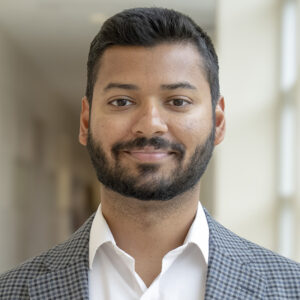
Ahtesham (Ash) Khan joined the Department of Medical Physics faculty in July 2025 as an assistant professor. Khan joins the University of Wisconsin Medical Radiation Research Center where his current research area is FLASH radiotherapy. He is a Department of Medical Physics alumni and also completed a residency at Northwestern University.
What is your hometown? Where did you grow up?
I grew up in Lahore, Pakistan, which is the second largest city in the country with around 14 million population. I relocated to the U.S. after high school and moved around during my late teens and 20s to pursue higher education and discover different types of careers.
What is your educational/professional background?
For my undergraduate education, I went to Hamilton College, a liberal arts school in upstate New York, and majored in Physics. I spent a year afterwards teaching high school in New York City and was fortunate to pursue my doctorate in Medical Physics at the University of Wisconsin–Madison under Professor Larry DeWerd. I then matched with Northwestern University in Chicago and trained in Clinical Medical Physics before returning to UW–Madison.
What is your field of research, and how did you get into it?
My area of research is to advance radiation measurement technology and delivery for medical purposes especially cancers. During my time at UW–Madison and Northwestern, I worked with alpha-emitting radionuclides for metastatic cancer therapies and advancing radiation measurement methods for MRI-guided radiation therapy. I have always been fascinated with applying my physics knowledge to advance medicine. Medical physics attracted me since it combines many of the disciplines that I enjoyed studying during college such as physics, mathematics, computer science, statistics, chemistry, and biology.
What are the main goals of your current research?
The focus of my current research is FLASH radiotherapy, which is a recently rediscovered mysterious effect that appears to reduce radiation-induced side effects when radiation is delivered in less than a fraction of a second. My lab is focusing on creating better detection methods for such radiation beams and performing pre-clinical studies to investigate the mechanism behind the FLASH effect.
What attracted you to UW–Madison?
Few people know this, but the medical physics department at UW–Madison is one of the oldest in the world in my field and has a rich history of turning ideas into creative clinical solutions and discoveries. The resources that the university and the department have to offer are unparalleled. I wanted to pursue my career at a place where I can collaborate with like-minded individuals driven by the same goal. UW–Madison is the best place to do that.
What’s your favorite place on campus?
I will have to go with the classic answer here, which is the “terrace.” I have many memories of spending time with my peers and mentors at the terrace discussing cool science. There is something calming about looking at the lake and being around a community of people that brings peace to me.
What’s the most important lesson you wish to convey to students?
Pursue your wildest ideas, but also know when to back off and invest in a different direction. Graduate school is the time when you can propose to do something revolutionary and have people support you. But it is also important to accept that not every idea will work. Sometimes we want to dwell on an idea for a long time and forget that we have limited time. There are many shiny things in the world to pursue!
Do you feel your work relates to the Wisconsin Idea? If so, how?
Absolutely! My work is directly tied to advancing radiation therapy for cancer patients, a disease that greatly affects the Wisconsin community. A large component of my job is to educate and train the next generation of scientists and clinicians who can join the fight against cancer.
What’s something interesting or surprising about your area of expertise that will make us sound smarter at parties?
A fun fact related to my doctoral thesis work is that alpha particles used in some cancer therapies travel less than the width of a human hair – yet they can still destroy cancer cells.
Do you have hobbies or interests outside of your work?
I recently gained a lot of interest in playing pickleball and doing yoga. I also enjoy cooking, running, and finding unique restaurants.